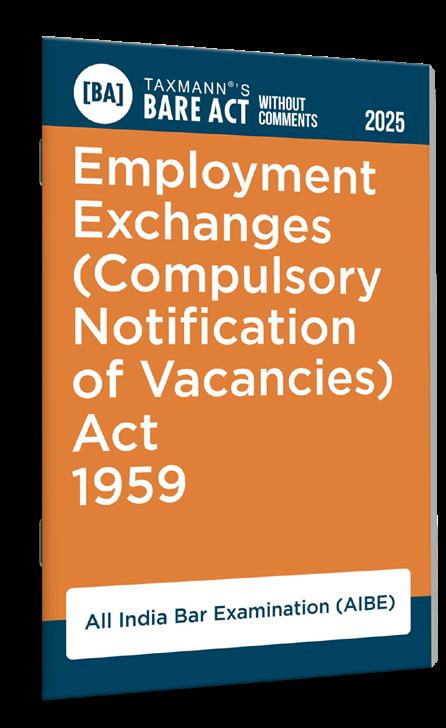


















[31
1959]1
An Act to provide for the compulsory notification of vacancies to employment exchanges.
BE it enacted by Parliament in the Tenth Year of the Republic of India as follows:— Short title, extent and commencement
1. (1) This Act may be called the Employment Exchanges (Compulsory Notification of Vacancies) Act, 1959.
(2)It extends to the whole of India 2[***].
(3)It shall come into force in a State on such date3 as the Central Government may, by notification in the Official Gazette, appoint in this behalf for such State and different dates may be appointed for different States or for different areas of a State.
Definitions
2. In this Act, unless the context otherwise requires,—
(a) “appropriate Government” means—
(1) in relation to—
( a) any establishment of any railway, major port, mine or oilfield, or
(b) any establishment owned, controlled or managed by—
(i)the Central Government or a department of the Central Government,
*Shall be repealed by the Code on Social Security, 2020, with effect from a date yet to be notified.
1. Dated 2-9-1959.
2. Words “except the State of Jammu and Kashmir” omitted by the Central Labour Laws (Extension to Jammu and Kashmir) Act, 1970, w.e.f. 1-9-1971.
3. With effect from, 1-5-1960, vide Notification No. G.S.R. 382, dated 1-4-1960, in respect of all the States to which the Act extends and in the Union territories of Delhi, Himachal Pradesh, Manipur and Tripura w.e.f. 1-5-1960. In Andaman and Nicobar Islands and Lakshadweep (U.T.) it became enforceable w.e.f. 1-7-1978 vide G.S.R. 803, dated 17-5-1978 and in Sikkim, w.e.f. 5-8-2005 vide S.O. 1103(E), dated 5-8-2005, subject to certain conditions.
(ii) a company in which not less than fifty-one per cent of the share capital is held by the Central Government or partly by the Central Government and partly by one or more State Governments,
(iii) a corporation (including a co-operative society) established by or under a Central Act which is owned, controlled or managed by the Central Government, the Central Government;
(2) in relation to any other establishment, the Government of the State in which that other establishment is situate;
(b) “employee” means any person who is employed in an establishment to do any work for remuneration;
(c) “employer” means any person who employs one or more other persons to do any work in an establishment for remuneration and includes any person entrusted with the supervision and control of employees in such establishment;
(
d) “employment exchange” means any office or place established and maintained by the Government for the collection and furnishing of information, either by the keeping of registers or otherwise, respecting—
(i) persons who seek to engage employees;
(ii) persons who seek employment; and
(iii) vacancies to which persons seeking employment may be appointed;
(
e) “establishment” means—
(a) any office, or
(b) any place where any industry, trade, business or occupation is carried on;
(
(
f) “establishment in public sector” means an establishment owned, controlled or managed by—
(1) the Government or a department of the Government;
(2) a Government company as defined in section 617 of the Companies Act, 1956 (1 of 1956);
(3) a corporation (including a co-operative society) established by or under a Central, provincial or State Act, which is owned, controlled or managed by the Government;
(4) a local authority;
g) “establishment in private sector” means an establishment which is not an establishment in public sector and where ordinarily twenty-five or more persons are employed to work for remuneration;
(h) “prescribed” means prescribed by rules made under this Act;
(i) “unskilled office work” means work done in an establishment by any of the following categories of employees, namely:—
(1) daftri;
(2) jemadar, orderly and peon;
(3) dusting man or farash;
(4) bundel or record lifter;
(5) process server;
(6) watchman;
(7) sweeper;
(8) any other employees doing any routine or unskilled work which the Central Government may, by notification in the Official Gazette, declare to be unskilled office work.
Act not to apply in relation to certain vacancies
3. (1) This Act shall not apply in relation to vacancies—
(
a) in any employment in agriculture (including horticulture) in any establishment in private sector other than employment as agricultural or farm machinery operatives;
(
b) in any employment in domestic service;
(
c) in any employment the total duration of which is less than three months;
(d) in any employment to do unskilled office work;
(
e) in any employment connected with the staff of Parliament.
(2) Unless the Central Government otherwise directs by notification in the Official Gazette in this behalf, this Act shall not also apply in relation to—
(a) vacancies which are proposed to be filled through promotion or by absorption of surplus staff of any branch or department of the same establishment or on the result of any examination conducted or interview held by, or on the recommendation of, any independent agency, such as the Union or a State Public Service Commission and the like;
(b) vacancies in an employment which carries a remuneration of less than sixty rupees in a month.
Notification of vacancies to employment exchanges
4. (1) After the commencement of this Act in any State or area thereof, the employer in every establishment in public sector in that State or area shall, before filling up any vacancy in any employment in that establishment, notify that vacancy to such employment exchanges as may be prescribed.
(2) The appropriate Government may, by notification in the Official Gazette, require that from such date as may be specified in the notification, the employer in every establishment in private sector or every establishment pertaining to any class or category of establishments in private sector shall, before filling up any vacancy in any employment in that establishment, notify that vacancy to such employment exchanges as may be prescribed, and the employer shall thereupon comply with such requisition.
AUTHOR : TAXMANN’S EDITORIAL
PUBLISHER : TAXMANN
DATE OF PUBLICATION : AUGUST 2025
EDITION : 2025 EDITION
ISBN NO : 9789371266895
NO. OF PAGES : 12
BINDING TYPE : PAPERBACK

BOARD

Employment Exchanges (Compulsory Notification of Vacancies) Act 1959 [Bare Act without Comments] by Taxmann for All India Bar Examination (AIBE) provides the complete, unaltered text of India’s legislation mandating the notification of vacancies to employment exchanges. The 2025 Edition, updated with all amendments, is free from commentary, making it an accurate, exam-compliant reference. It is an essential resource for understanding employer obligations in public and private sectors on vacancy notifications, returns, and compliance.
The Present Publication is the 2025 Edition, covering the amended and updated text of the Employment Exchanges (Compulsory Notification of Vacancies) Act [Act No. 31 of 1959], with the following noteworthy features:
• [Complete & Authentic Text] Full statutory provisions as amended, without commentary
• [Exam-compliant Format] Designed for quick reference during AIBE and other law exams
• [Logical Arrangement] Section-wise layout as per the official legislative structure
• [Comprehensive Coverage] Includes definitions, applicability, employer duties, exemptions, penalties, and rule-making powers
• [Portable & Durable] Compact binding for easy exam